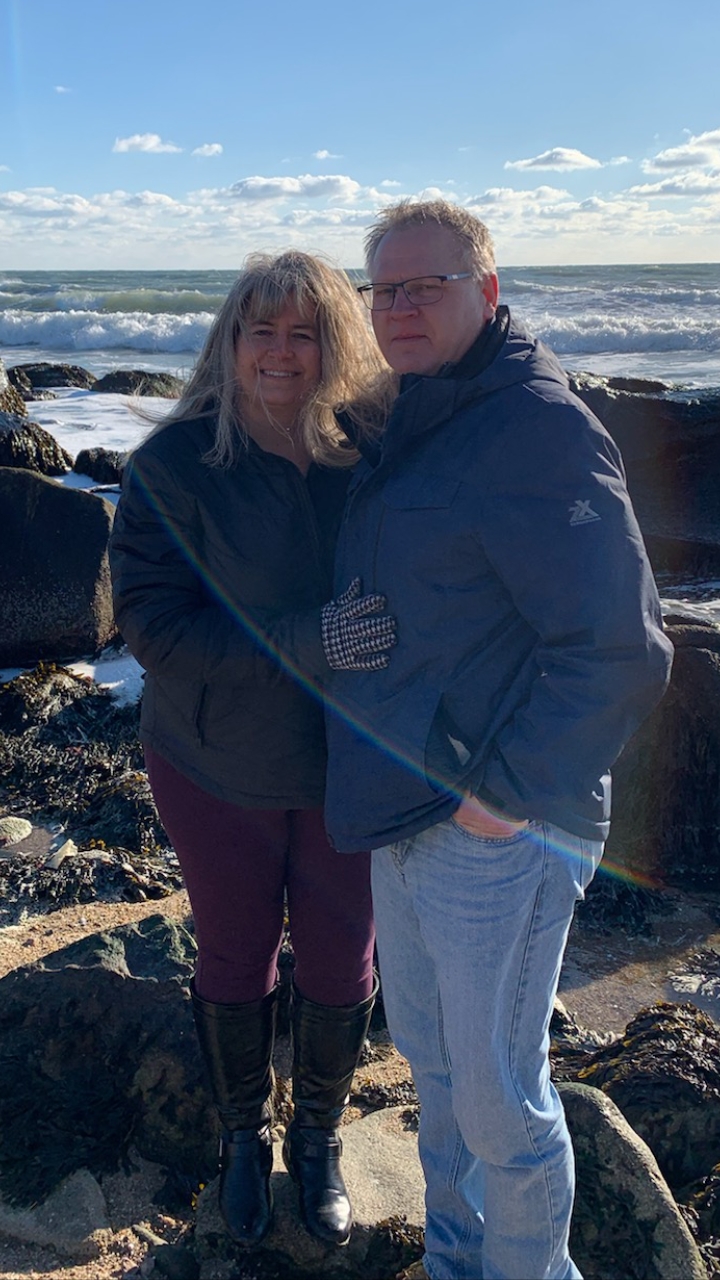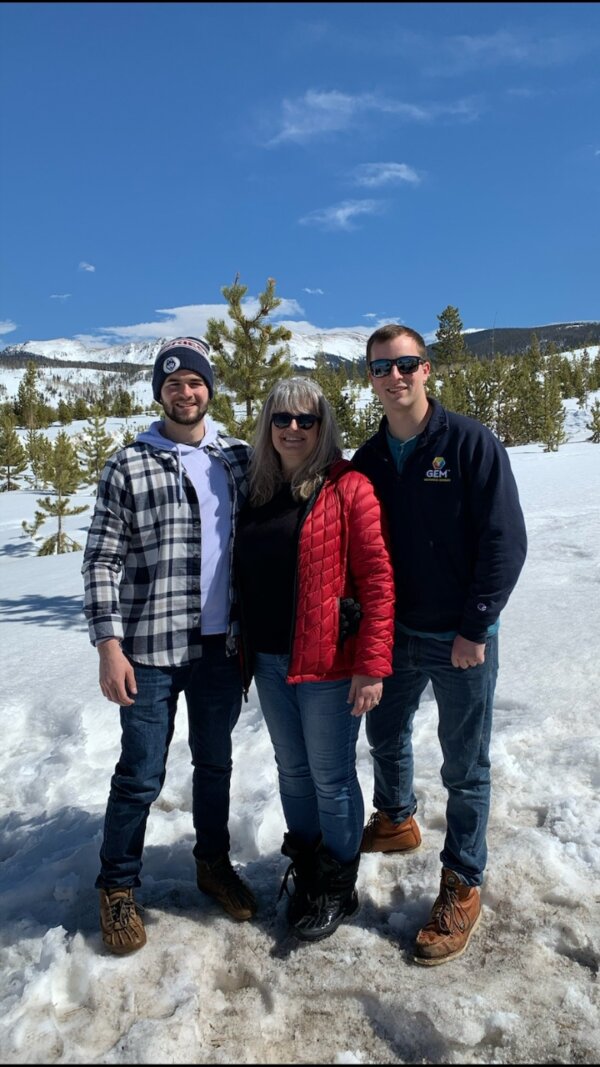My name is Julie Dukes, and I am 51 years old. I grew up in a small rural town in Iowa. Most recently, I lived in Connecticut for 15 years, where I raised my two amazing boys. Five years ago, I reunited with my High School sweetheart, we married, and I moved back to Iowa. I enjoy spending time with family, crafting and traveling. Proudly, I have been a critical care nurse for thirty years. Another thing I enjoy is bringing happiness to others.
When I recently learned of The United Brain Association, I really identified with their mission. Not only because it relates to my career, but also on a personal level. I, myself, have a Brain Story to tell. Maybe I can help someone realize that they are not alone and that it is okay to seek help for depression. By sharing my story, what I do not want is sympathy. If you are reading my story, and you know me personally, please don’t feel sorry for me or think you have to tell me, “It’s going to be okay.”

My Brain Story is about depression, specifically, Bipolar II Disorder. It is characterized by periods of depression and hypomania. Think of hypomania as a mild type of mania (a hyperactive state). Instead of hyperactive, hypomania is more of just an elevated mood. The depressive and hypomania states alternate in a sort of cyclic pattern. My depression episodes in the past were severe. The hypomanic episodes just brought me up to a normal level of functioning. It is during those periods when I am at my best. I am focused, have clarity, and am more productive. For many years (since being on the right combination of medication), I don’t even notice the fluctuations in mood.
Living With Bipolar Disorder – Diagnosis and Challenges
I have been dealing with bipolar illness most of my adult life since my mid-twenties. During that time, I also had undiagnosed postpartum depression. I didn’t seek treatment until my thirties when the depression became debilitating. My diagnosis of Bipolar II Depression didn’t come until about age 35.
My depression got progressively worse when my kids were toddlers. As my life became more stressful and I tried to deal with adult responsibilities, the symptoms of depression began to spiral out of control. I remember the day I finally sought treatment. I was upstairs lying on the floor crying while the kids played downstairs. My body felt like it was cast in cement. Life was such a heavy burden that I could no longer carry. For some reason, that day, I came to realize that I just couldn’t go on like that. I went through the phonebook and started calling Psychiatrists. When the first three could not see me, I became so discouraged. But I made one more call and was able to get help. By the way I was crying on the phone, I was shocked that not one of them asked if I was having any suicidal thoughts. I consider myself blessed that I have never been suicidal. Even in my deepest, darkest depression, I have never thought of ending my life. It is a topic that people don’t like to talk about, but it is real and needs to be addressed.
Depression has impacted my life in many ways. My self-worth was nonexistent. I felt like a bad mom most of the time. My marriage suffered and finally ended in divorce. Making friends was very difficult because I mostly stayed home. One symptom of my depression was sleeping all of the time, which was easy to blame on my night shift hours at work. Eventually, I had to go part-time because I struggled to keep my own life together, let alone take care of other people. Today, at this stage of my life, I have a successful career, happy marriage, and spend a lot of time with my family and friends.
Treatments and Coping With Day-to-Day Life
My treatment for bipolar initially consisted of weekly counseling sessions with the Psychiatrist. My first diagnosis was Major Depressive Disorder. I started on different medications for depression. After many medications failed to help, he diagnosed me with Treatment-Resistant Depression. But we kept trying different combinations. So many pills. Pills to help me sleep at night. Pills for ADD to keep me awake during the day. Pills for depression. Nothing seemed to work until we tried a medication used for Bipolar Disorder. The fog finally lifted! My new diagnosis was changed to Bipolar II Disorder. It felt more like a label than a disease.
There are many ways that help me cope with this diagnosis, even though it does affect my day-to-day life. I would be lying if I didn’t include denial as a form of coping. It’s not a positive coping skill, but it’s the truth. With that being said, I try to stay positive and be thankful for all the good things I have. Part of the reason I am sharing my story is to have full transparency with myself. It is so easy to blame myself and be ashamed of the fact that I am bipolar. Therefore, self-forgiveness is key. I remind myself often that I am a strong, independent, successful woman. I will never be perfect, and I am okay with that.

I feel like I am not alone in trying to hide my depression from people.I sometimes have to put on a happy face. Some days are harder than others.
There are many challenges to face when you have depression. Getting help is the biggest one. Seeking treatment means you have to admit to yourself that you have a problem. Denial is so much easier, but facing your fears is the first step in healing.
I am hoping that my story will help people understand Bipolar Disorder. If you know someone who is struggling as I did, just be supportive. If just one person gets help by reading my story, then I have succeeded. I want people to know that they can feel better and things are not hopeless. It feels so amazing to climb the ladder to happiness.
My advice for others is: Seek help. Seek help. Seek help. Call a Psychiatrist when you finish reading this article. I did, and it was the best move I have ever made. Be honest with yourself, your friends, and your family. You don’t have to feel ashamed or embarrassed that you have a disease. Let down your guard and let someone help you. Ignoring your depression will not make it go away. You can live the life you imagine.

There are many social limitations to someone living with Bipolar Disorder. In my case, my biggest challenge was that I isolated myself. I didn’t have the energy to live my own life, let alone share it with others. If I did make plans with people, I would often make excuses of why I had to cancel. I used to have a fear that people would find out that I was depressed. I thought they would think I was just crazy. Now I want my friends and family to know so they can help me keep it in check. I don’t feel the need to hide it any longer.
Things that bring me joy are my boys, husband, and family. It has been a journey to get where I am today. They have been so supportive on this road to healing. My career is also a way for me to stay positive. It is very rewarding to bring happiness and healing to other people. I am a mentor at work with many new nurses, which is also very fulfilling. Staying busy is a way to keep me on track, as well. When I’m not working or traveling, I fill my time by volunteering for a hospice organization.
It is difficult to overcome the fact many stereotypes surround Bipolar Disorder and depression. It is a chemical imbalance in the brain. It doesn’t mean the person is “crazy.” Please know that it is simply a disease like heart disease or diabetes. It is treatable by balancing the chemical disruption with medication and other therapies.
If you or a loved one are experiencing a break in your mental health, suicidal thoughts, or feelings that compel you to self-harm, please click here for a list of mental health resources. These feelings are not your fault, you are not alone, and there are many people out there that want to see you happy, healthy, and safe.
For information on upcoming and current research projects, including those that assist in improving mental health, visit our research projects here. For updates on the United Brain Association’s news, events, and blog publications, sign up for our email list here. Together we can help find a cure and advance treatments for brain disorders and diseases by propelling promising research to success through donations.
You Are Not Alone
For you or a loved one to be diagnosed with a brain or mental health-related illness or disorder is overwhelming, and leads to a quest for support and answers to important questions. UBA has built a safe, caring and compassionate community for you to share your journey, connect with others in similar situations, learn about breakthroughs, and to simply find comfort.

Make a Donation, Make a Difference
We have a close relationship with researchers working on an array of brain and mental health-related issues and disorders. We keep abreast with cutting-edge research projects and fund those with the greatest insight and promise. Please donate generously today; help make a difference for your loved ones, now and in their future.
The United Brain Association – No Mind Left Behind




